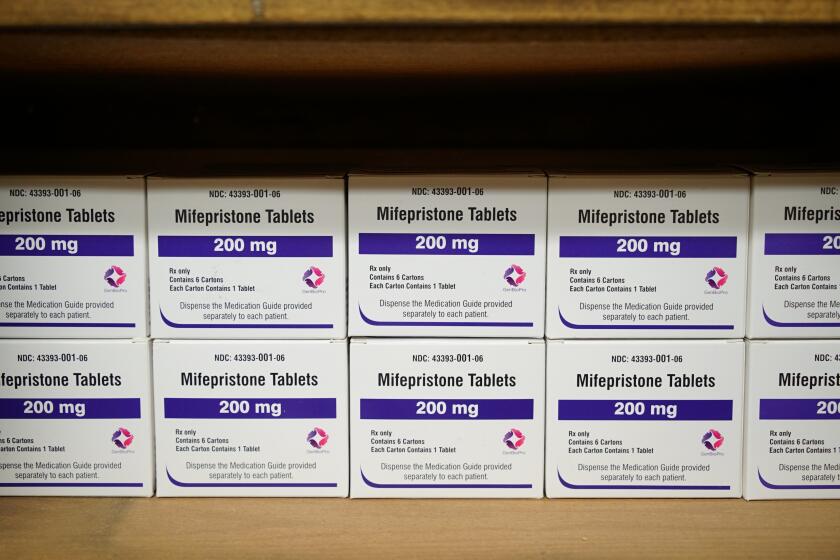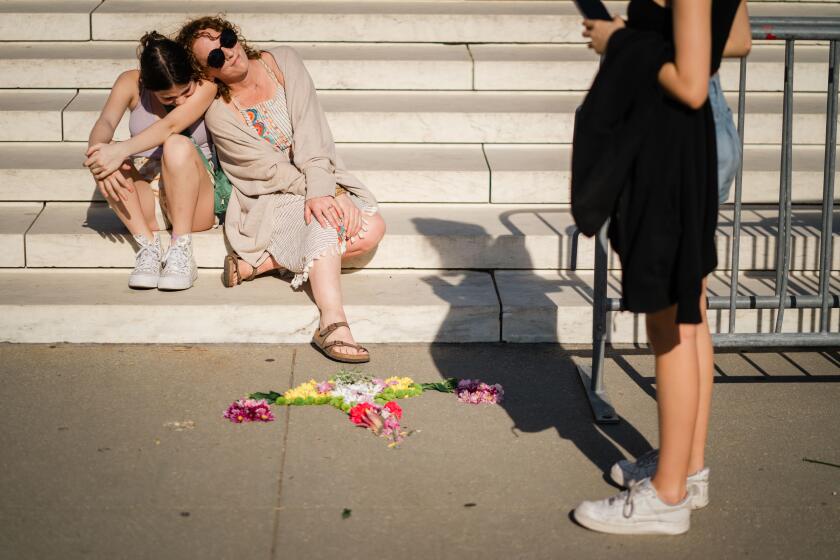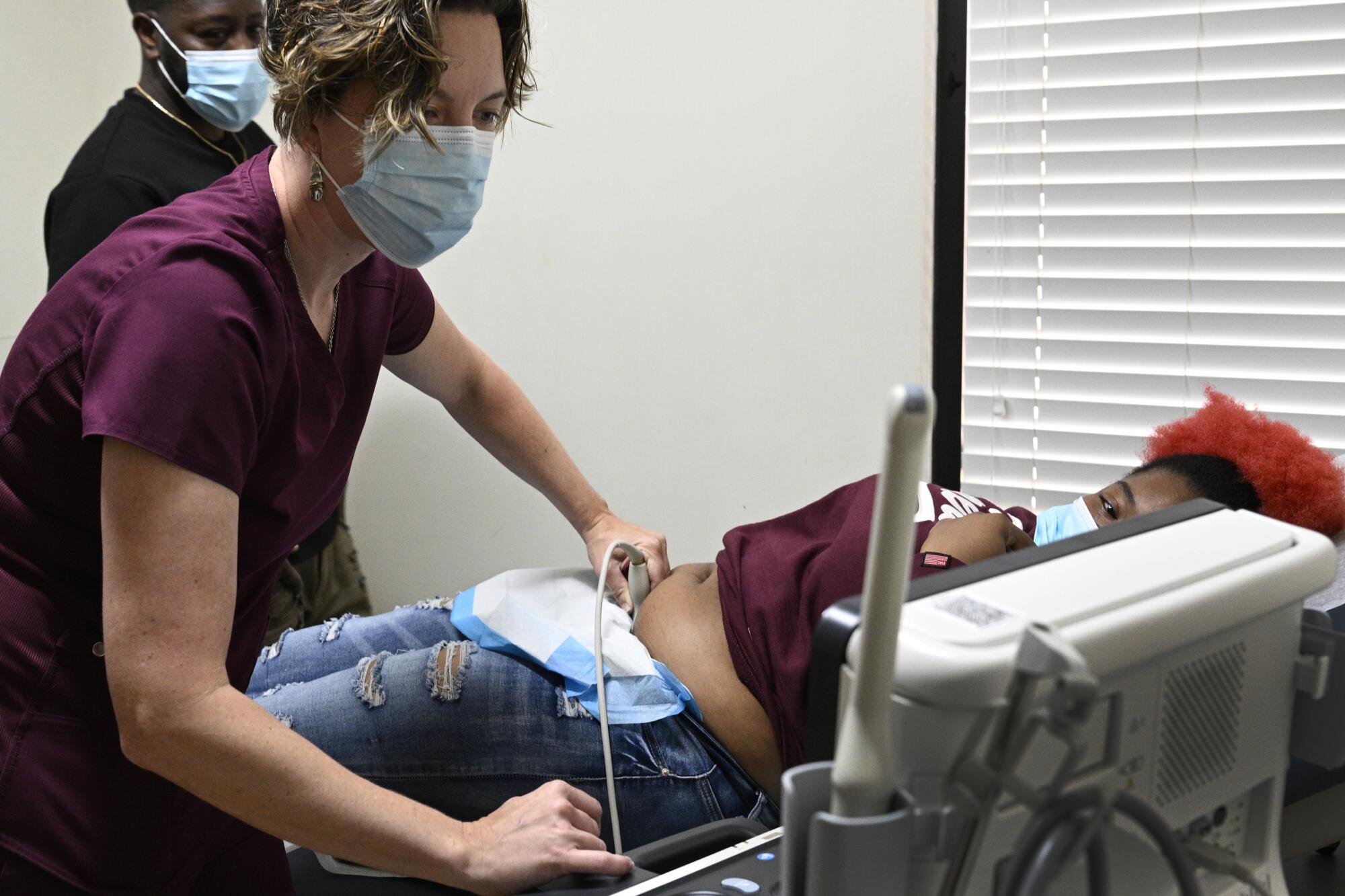
- Share via
TUSCALOOSA, Ala. — People often ask Dr. Leah Torres why she stays in Alabama.
The 43-year-old OB-GYN — who strides into her clinic most mornings wearing a clitoris pendant and T-shirts with a slogan declaring “ABORT THE PATRIARCHY” — does not consider this conservative Deep South state her home.
A few weeks after she arrived, the state Board of Medical Examiners revoked her temporary medical license to practice, accusing her of ethical violations.
It took her seven months to get it back, a legal battle that cost her $115,360.93, according to the price tag she affixed to the framed license hanging in her office at the West Alabama Women’s Center.
The center was one of the busiest abortion clinics in the state, until the Supreme Court struck down Roe vs. Wade last year. Abortion became illegal in Alabama, one of over a dozen states with full bans. Now that doctors who perform the procedure in Alabama risk up to 99 years in prison, Torres finds herself, once again, unable to offer the full spectrum of reproductive medical care she was trained for.
But Torres has no intention of backing down.
“You don’t want me here? That’s why I’m gonna stay,” she said, sitting at a desk strewn with laboratory invoices and a tiny fetus replica handed out by antiabortion campaigners. “I’m not leaving, just out of spite!”
Torres believes her work is not done in Alabama, a state with the third-highest maternal mortality rate in the nation and the sixth-highest infant death rate. The Republican-dominated Legislature joined nine other conservative states in refusing to expand Medicaid, which would allow more than 200,000 uninsured non-elderly adults in the state to become eligible for coverage.
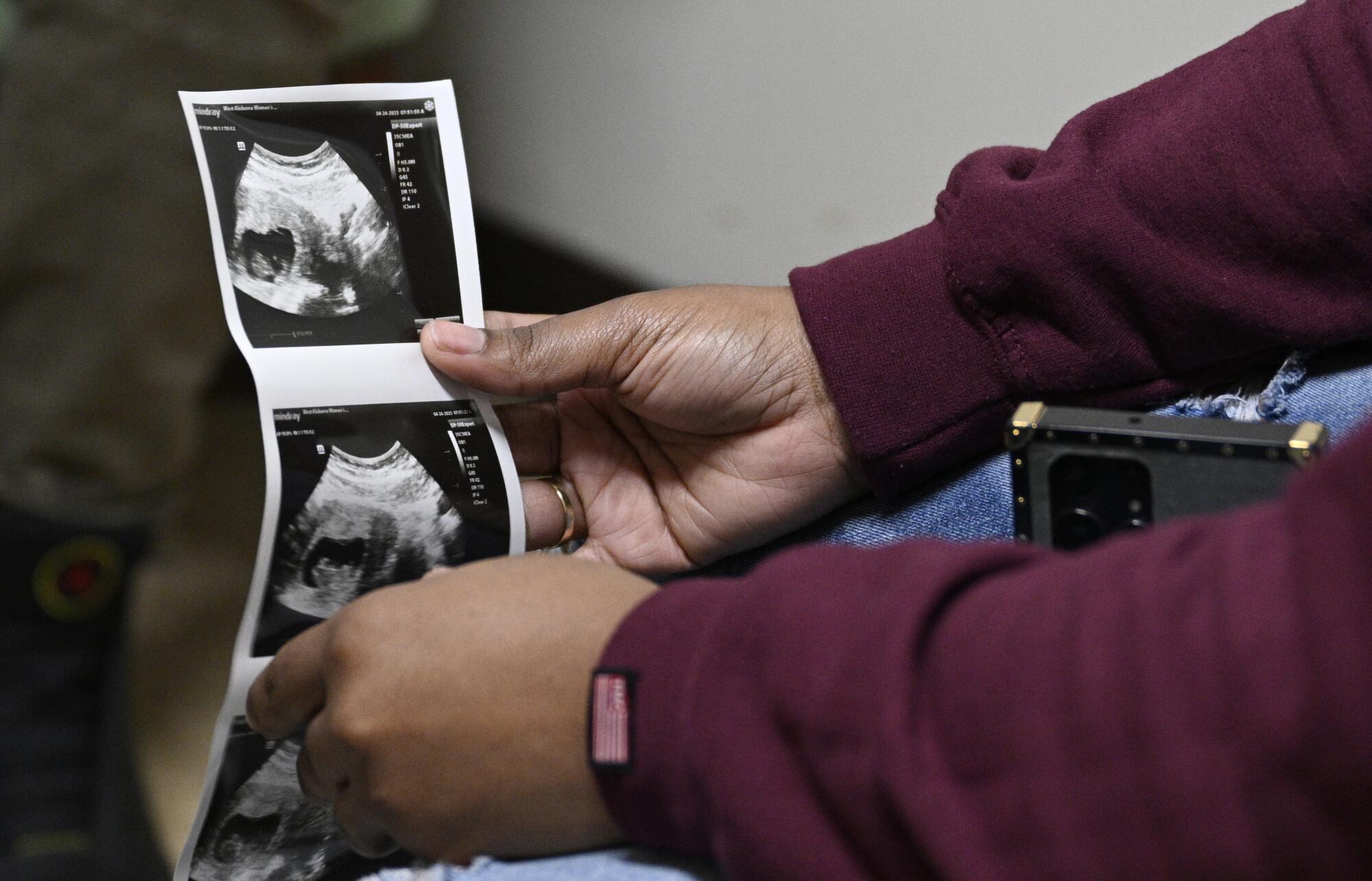
After shutting down for a week in July after the U.S. Supreme Court ruling, her clinic reopened its doors as a “pay what you can” nonprofit offering low-income and uninsured women basic reproductive health services that can be hard to access in Alabama.
Torres and the clinic are offering hormone therapy for transgender people, including teenagers — wading into another culture-wars fray at a time when Alabama and other conservative states are moving to ban such treatment for minors.
“There’s so much work here,” Torres said. “Alabama’s really dead set on compromising people’s lives, especially LGBTQ+ youth, especially pregnant people. These are expendable people in the eyes of the state of Alabama.”
‘We have to push back’
When Tina Collins, the front office manager, picks up the phone — “West Alabama Women’s Center!” — she frequently has to inform callers the clinic no longer provides abortions.
“No ma’am, we do not,” she says gently in her south Georgia drawl. “They are illegal in Alabama. You can go to our website, the West Alabama’s Women’s Center, or you can go to the website redstateaccess.org.”
In July, when the tiny brick clinic reopened with abortions no longer on its list of services, staff members were nervous. Robin Marty, the clinic’s director of operations, gave everyone firm instructions not to provide callers with information on obtaining abortions out of state or by mail.
Now they’ve adopted a slightly bolder approach, plastering the reception window with stickers offering website links for abortion information. “Need to be unpregnant?” asks a sticker at eye level of the front desk. “RED STATE ACCESS CAN HELP.”
“Safe. Private. Informed,” another says. “Learn about self-managed abortion.”
“We have to push back,” Marty said. “If we don’t test these things, then they won already … and we’re going to be trapped forever.”
As abortion clinics have shuttered across Alabama, Mississippi and Louisiana, national organizations have devoted resources to setting up new centers and mobile clinics in blue states. But women who travel for abortions still need care when they come home.
Earlier this month, a 20-year-old nursing student came to the clinic with her mother for a follow-up appointment a month after driving to Georgia for a medication abortion.
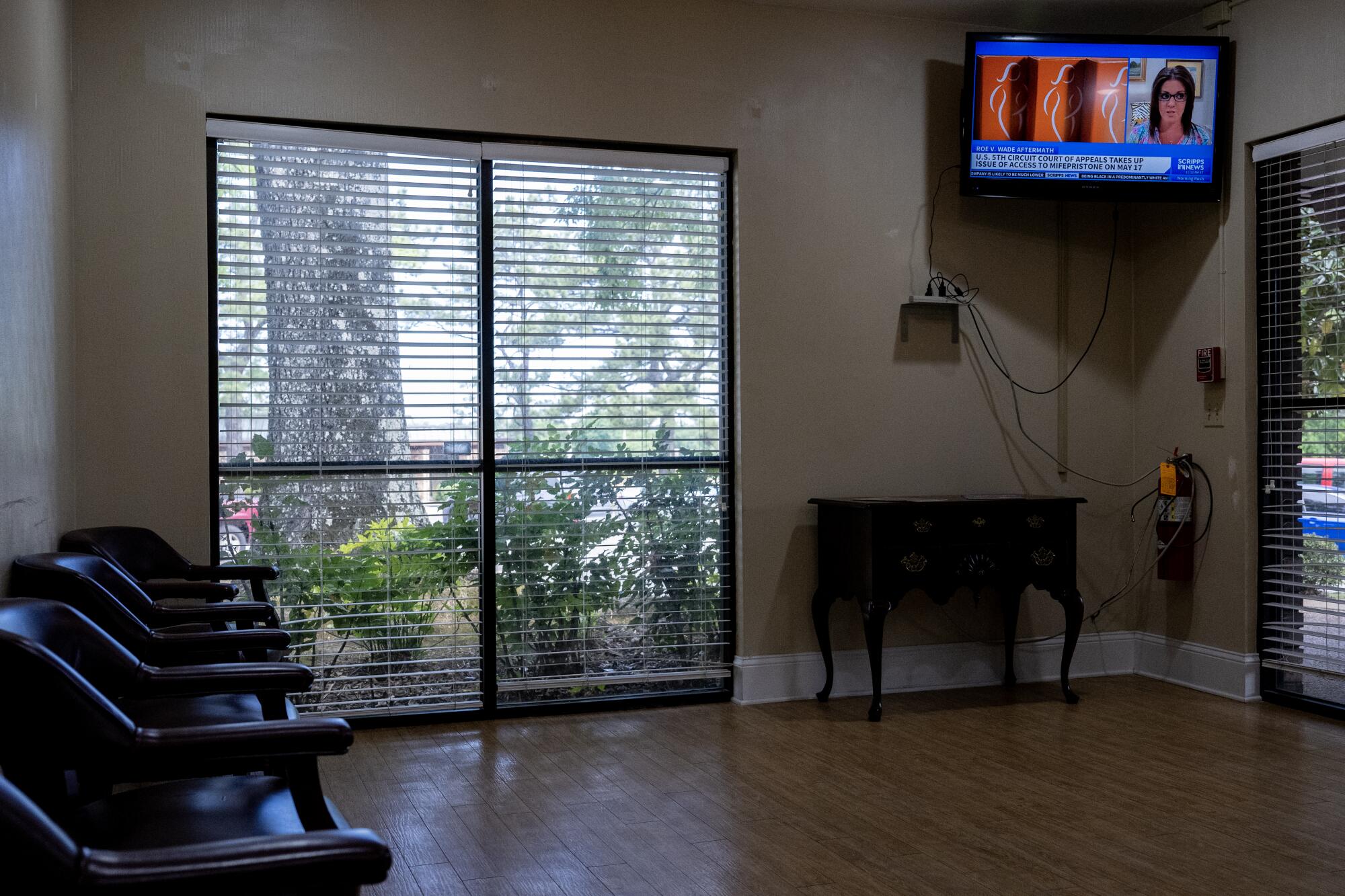
After passing a sign that said “Still Open for Non-Abortion Services,” they slipped through a glass door into an empty waiting room that used to teem with patients. On the day before Roe was overturned, 67 people came to the clinic for medication abortions. Now the clinic sees about 15 patients a week.
The medication had worked and there were no complications, but the woman’s mother was indignant that politicians had forced them to take a day off work and school to make the six-hour round trip to Atlanta.
“I feel like your body is yours, not the government’s,” said Renetha Abernathy, a 57-year-old nurse. “We should have full healthcare right here in our own area, so we can make that choice.”
Abortion pill ruling: A federal judge in Texas halts FDA’s approval of mifepristone, an abortion medication. But another judge contradicts the ruling.
Conservative Supreme Court refused to second-guess the FDA’s approval of abortion pills as safe and effective.
Earlier that week, Torres met a pregnant patient who told her that the local OB-GYN clinic that gave her prenatal care and delivered her baby 15 months ago made her wait nearly three hours for an appointment and rebuked her when she complained. The woman suspected — as did Torres — that the stark discrepancy in care was because she had switched from Blue Cross Blue Shield to Medicaid.
Even patients with insurance have trouble accessing care. Tyeshia Smith, 31, a mental health worker who has done sex work, came to the clinic because she wanted another child but worried about her fertility. Her menstrual cycle had become irregular in recent months, and she feared sexually transmitted diseases had taken a toll on her body.
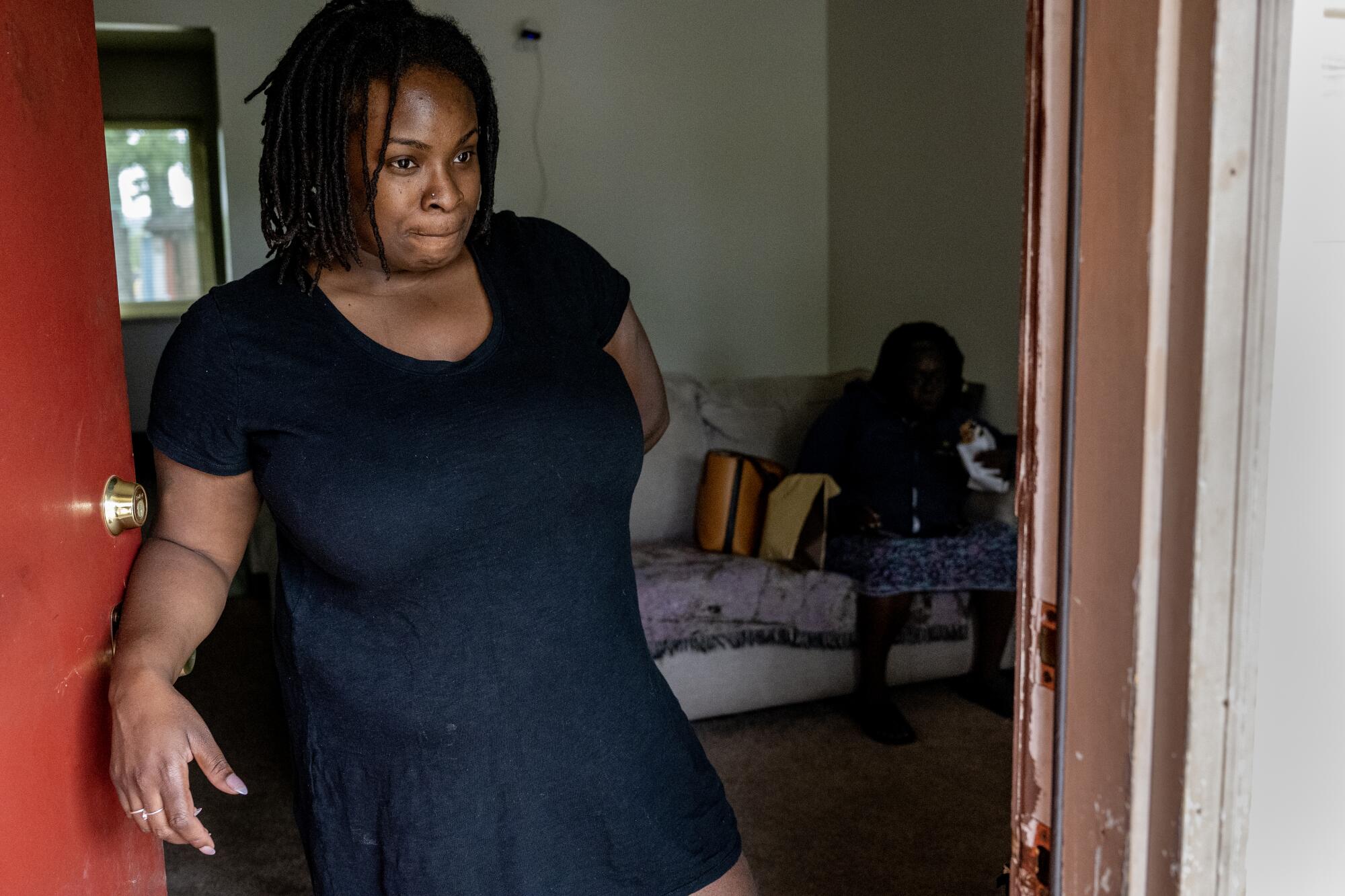
The first clinic she called couldn’t see her until July. Another didn’t answer, so she left a voicemail.
“Every aspect of healthcare here in Alabama to me is 20 years back,” Smith, who is from Ohio, said as she waited in an exam room for a Pap smear.
Over the last year, Torres has treated women who have miscarried or learned their pregnancies are nonviable and have trouble finding care, as physicians across the state become more fearful of ending up in jail.
Marjorie Dannenfelser started out as a pro-choice Republican. After changing her mind in college, she set out to outlaw abortion across the United States.
In February, Alison, a 36-year-old in Montgomery who spoke on condition that her full name not be used, started bleeding about seven weeks after getting pregnant via artificial insemination. When she went to her OB-GYN for an emergency ultrasound, she was told the pregnancy wasn’t viable — there was a sac, but no fetal tissue or heartbeat. The doctor, seeming uncomfortable, told her to go home and wait for her body to pass the tissue.
Over the next few days, Alison bled and cramped so badly she could not get out of bed. Her grief and anxiety swelled as she read online about sepsis and fretted that if the sac did not pass it could harm her fertility.
After the bleeding subsided the fifth day, she decided to drive 100 miles to Tuscaloosa to see Torres. The ultrasound showed she was out of danger. Torres spent 20 minutes reassuring her she had not done anything wrong.
“This is our body’s way of preventing us from heartache,” Torres told her, noting that sometimes bodies reject cells that are unhealthy. “Miscarriage is terrible; this was a blessing.”
For the first time during the ordeal, Alison said, she felt seen and taken care of.
Escaping ‘corporate medical hell’
The door to Torres’ office is usually open, adorned with buttons that say “TRUST WOMEN” and “I’M ON YOUR SIDE” and a flag that proclaims “ROUND THESE PARTS, WE RESPECT PRONOUNS.”
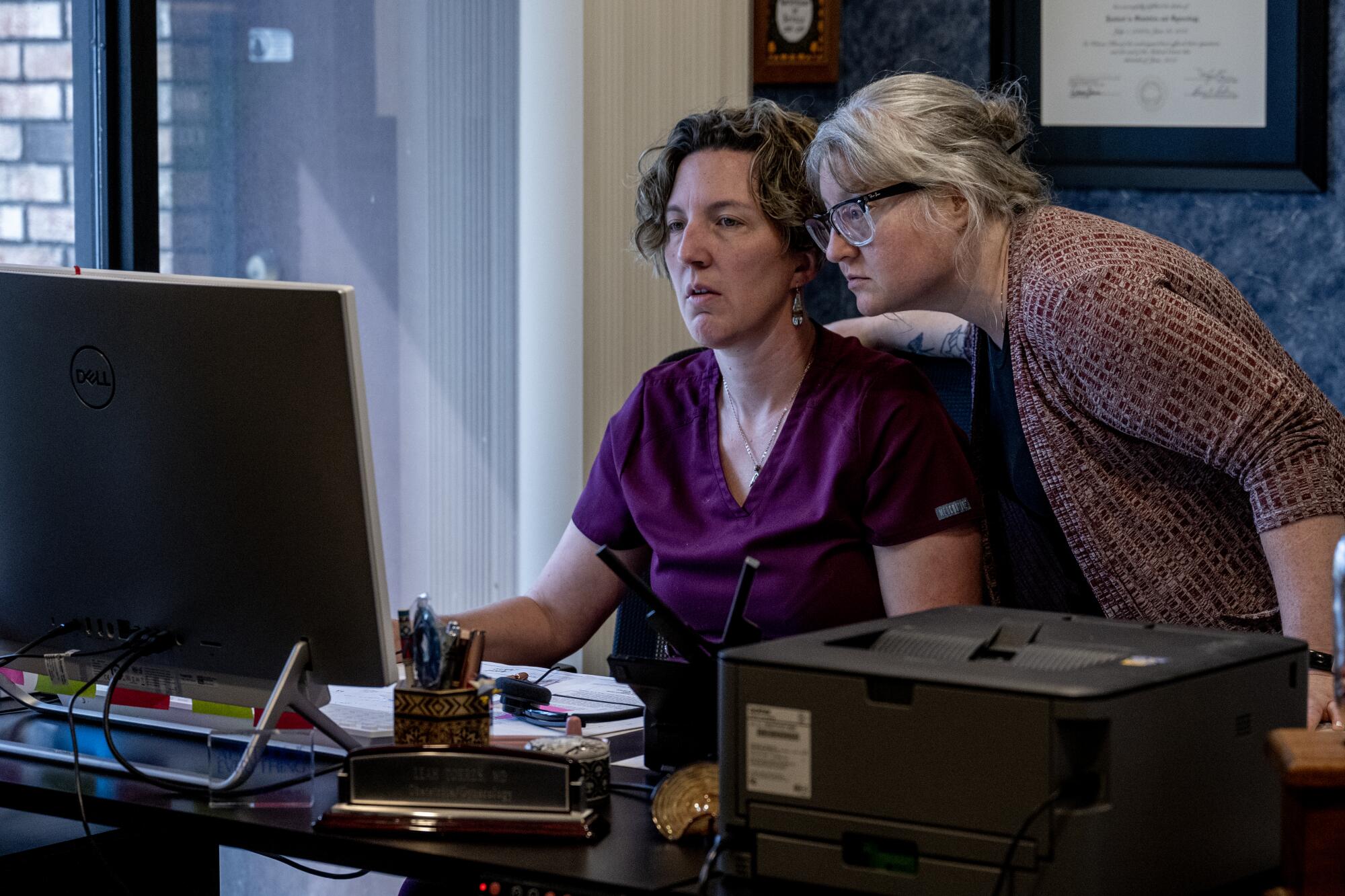
As an activist who promotes herself in her Twitter bio as a “sex+, gender-affirming repro health specialist”— tagline “GTFO of my uterus” — Torres has always chafed at the idea of the paternalistic physician.
“I am not going to be the ‘Do as I say’ doctor,” she said before meeting a transgender patient last week for a telehealth appointment. “I want them to understand that this is a team effort and that I’m not a magic wizard with all of the answers. I am a human being too.”
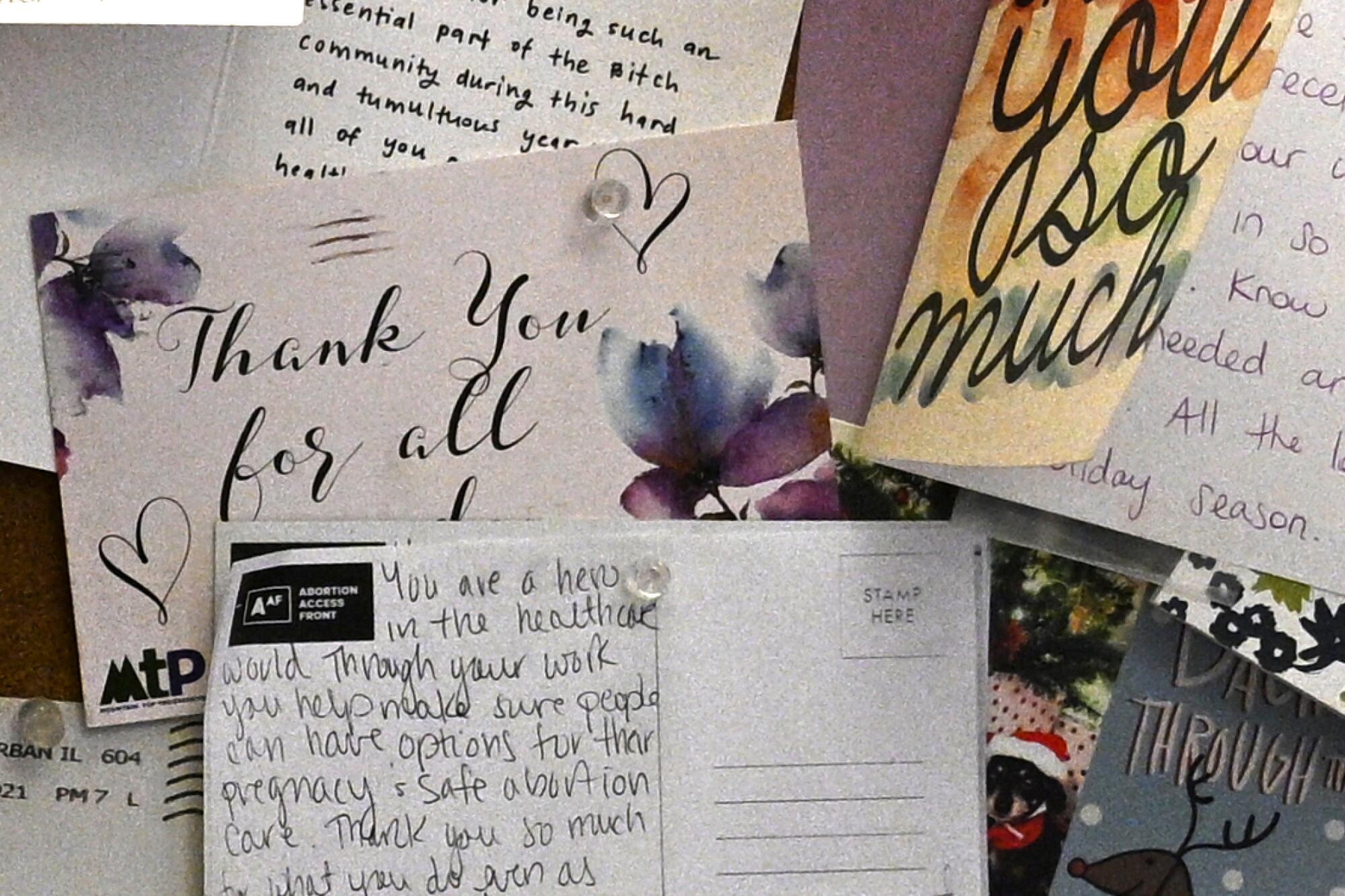
Throughout her medical career, Torres has often felt thwarted.
A Michigan native who also grew up in Florida, she studied medicine at the University of Illinois. After completing her OB-GYN and specialized family planning training in Philadelphia and Salt Lake City, she got a job in 2014 at a community clinic in northern Utah. The clinic would not let her incorporate abortion care into her general practice.
Her frustration built as she got embroiled in campaigns against Utah lawmakers’ attempts to restrict abortion.
In 2018, Torres found herself at the center of an online firestorm after someone on Twitter accused her of infanticide and asked: “Do you hear their heartbeats when you lay down at night?”
Torres replied: “You know fetuses can’t scream, right? I transect the cord 1st so there’s really no opportunity, if they’re even far enough along to have a larynx.”
In the 1950s and 1960s, the LAPD’s abortion squad hunted down women getting the procedure and the people performing them.
She refers to this incident now as the “tweet that broke my entire life.”
Conservative pundit Ben Shapiro shared her tweet, commenting, “This is like a James Bond villain explaining his plan to 007, but a lot less self-aware.” Torres deleted the post and clarified that she meant umbilical cord, not vocal cord. But the Daily Caller and a string of right-wing outlets posted articles naming Torres. Eventually, she was asked to sign a mutual separation agreement due to the death threats being received at the clinic.
Unable to find another job in Utah, she sued the Daily Caller for defamation, reaching a settlement in which she got $40,000. After a year without work, she moved to New Mexico to work at a hospital that did not perform abortions.
She earned enough to pay off her student loans but felt disenchanted. The system, as she saw it, did not just prevent doctors from performing a necessary procedure; it encouraged them to perform unnecessary ones, such as caesarean sections. “If a vaginal delivery pays half of what a C-section is, why would you do a vaginal delivery ever?” she said.
“Pregnant women — and I’ll just be cis-normative for a second — are walking dollar signs,” she railed. “They’re not people. They are a commodity that makes money for the hospital, for the healthcare network, for the insurance company and for the doctor.”
When Marty called Torres in March 2020 to ask if she would be interested in leaving New Mexico to take on the role of medical director of an abortion clinic in a different state, Torres jumped at the offer.
“Sign me up,” she said.
“Do you want to know where it is?” Marty asked.
“I don’t care,” Torres said. “I’m in corporate medical hell.”
Alabama is not a haven for Torres. The state faces a critical shortage of OB/GYNs. In 1980, 45 of the state’s 54 rural counties provided obstetric services; by 2019, the number was 16. A family of four qualifies for Medicaid benefits there only if the household income is under $450 dollars a month.
But the Tuscaloosa clinic offers Torres a place to serve the needy in a state that, as she sees it, is the “quintessential example of what corporate medicine really is.”
For Torres, it is nothing short of a miracle that the clinic is still open.
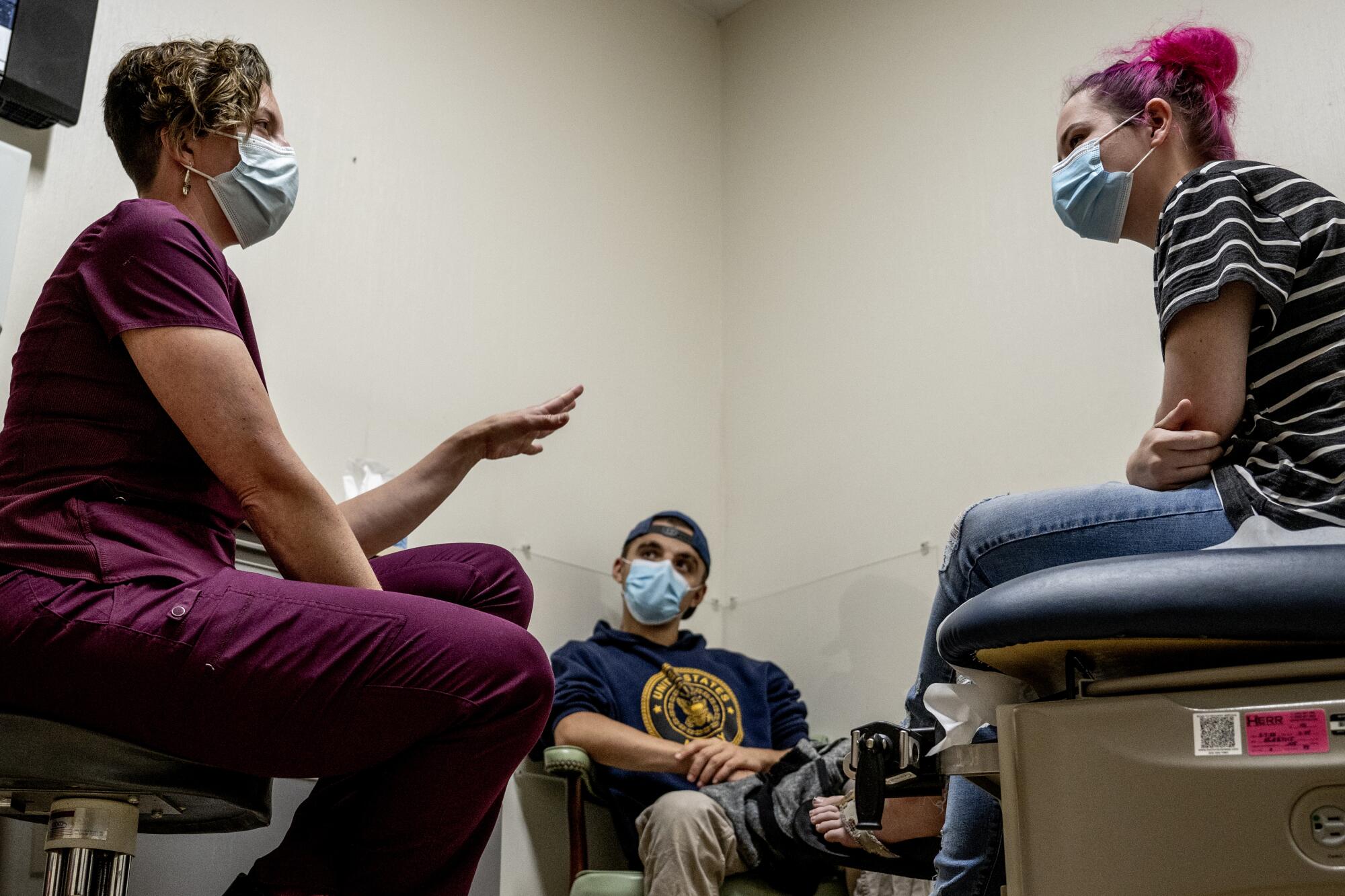
Before Roe was overturned, when 95% of patients came to the clinic for abortions, the clinic brought in $200,000 a month. In the last 10 months, revenue from patients has totaled $20,000. Marty laid off five of the clinic’s 11 staff members in August. But revenue has totaled $998,000, mostly through grants and fundraising, ensuring that the clinic can stay open at least through September.
A key prong of its new work is bringing in LGBTQ+ patients from across Alabama via telehealth appointments. The clinic is now offering HIV testing and medication to prevent HIV transmission.
It also provides hormone therapy to transgender patients, including minors — a move that is almost certain to bring the clinic into conflict with Alabama officials.
Transgender care, a new battleground
A year ago, Alabama became the first state to pass a law making it a felony for a doctor to prescribe or administer puberty blockers or hormone treatment to anyone younger than 19 “for the purpose of attempting to alter the appearance of or affirm the minor’s perception of his or her gender or sex” — with prison sentences of up to 10 years.
But the law is partially blocked by a federal court until a September hearing. After consulting with attorneys, the Tuscaloosa clinic is, for now, quietly offering minors hormone treatment. The clinic’s website states that it can “provide hormone therapy and other care to those over the age of 19,” but Torres said that a “whisper network” promoted services for minors.
Over the last year, Torres said, she has prescribed hormone treatment to about 50 transgender patients. Two were younger than 19.
“This is the healthcare people need to keep them safe,” Torres said. “I will fight for that.”
Across the U.S. and Europe, debate is raging among health professionals about how to treat a rising number of adolescents who identify as transgender. There are no long-term clinical studies looking at how hormone treatments may affect fertility and sexual function. Countries such as Sweden, France and the U.K. have in recent years reversed course and adopted a more cautious approach, citing potential side effects and a growing number of people who regret transitioning.
Last year, the World Professional Assn. for Transgender Health, the leading medical group for transgender care, published new standards of care for gender-diverse adolescents seeking medical treatment, recommending that healthcare professionals carry out “comprehensive biopsychosocial assessment” before providing them with puberty blockers, sex-changing hormones or mastectomies.
Torres does not believe adolescents seeking hormones require mental health evaluations.
“No, I don’t need a psychologist or psychiatrist to evaluate someone who’s telling me, ‘This is how I felt for years,’” she said. “I know that how they felt for years is not pathological.”
When meeting trans patients, Torres is upfront that she has been practicing such care for only a year.
“Full disclosure,” she tells them, “this area of medicine is pretty new to me.” She also points out that this is a relatively experimental area of medicine without a lot of data.
One transgender patient Torres recently started seeing through telehealth was referred to her because the teen’s pediatrician and staff at a psychiatric hospital did not respect his gender identity and used his old name. The teen, who had a history of depression and anxiety, told Torres he had known he was a boy for years and wanted to take sex-changing hormones.
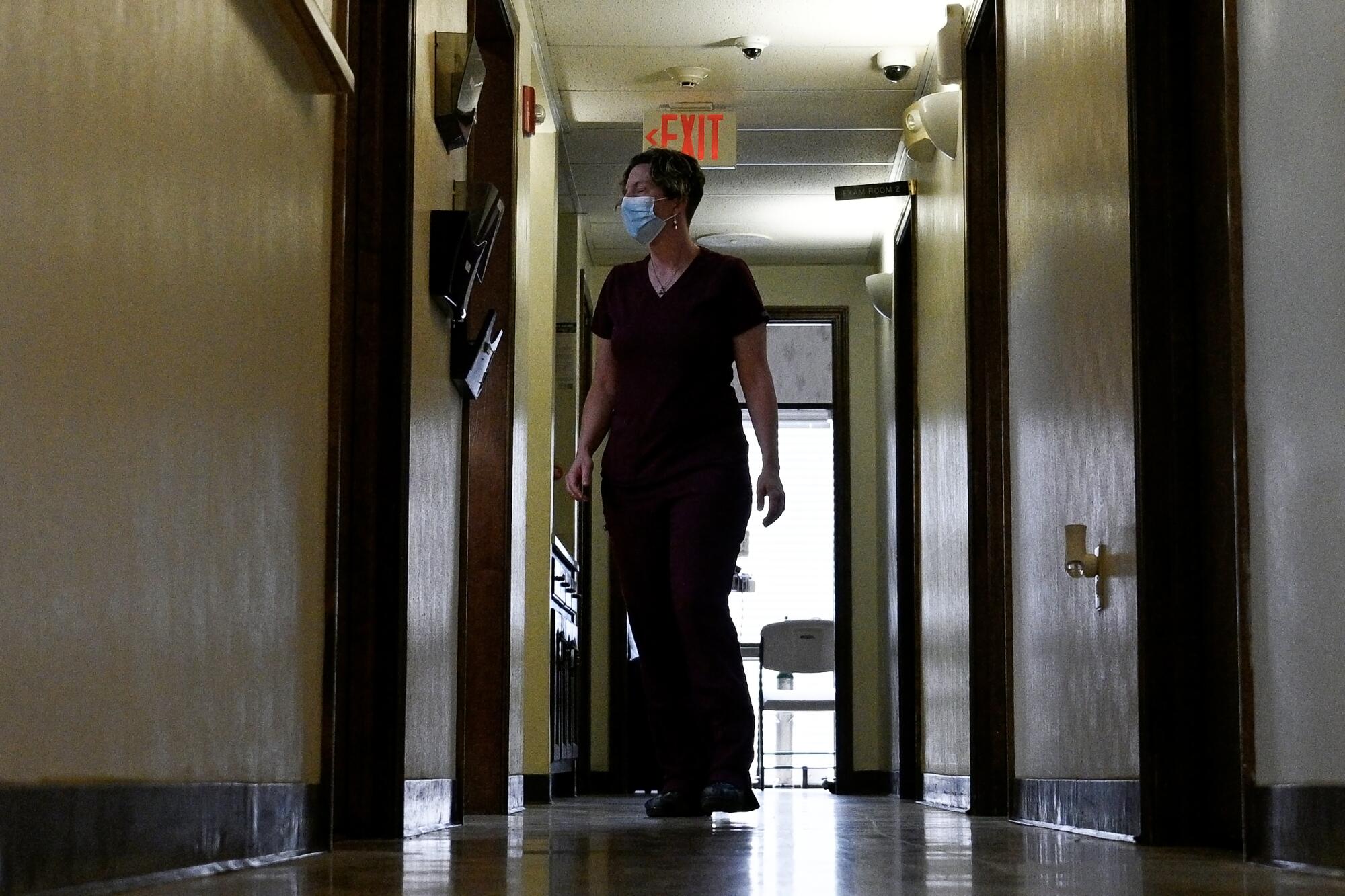
Torres told him straight up that she would prescribe a low dose of testosterone. She let the boy know she was glad he was seeing a therapist, even though she didn’t require it. She believes trans people need to deal with the trauma of trans bigotry in Alabama, she said.
When she told him she was prescribing testosterone, his face lit up, she said. He asked her, “You mean right today?”
And that, she said, was why she did her job. The teen had tried for so long to get healthcare and been unsuccessful. She believes she is offering lifesaving care.
“I will do whatever I can within legal parameters,” Torres said later. “But at the end of the day, if it’s somebody’s life versus a bad law, I’m choosing that person’s life.”
Hopefully, she said, there would never be a conflict.
More to Read
Sign up for Essential California
The most important California stories and recommendations in your inbox every morning.
You may occasionally receive promotional content from the Los Angeles Times.
